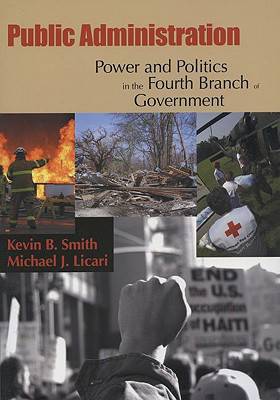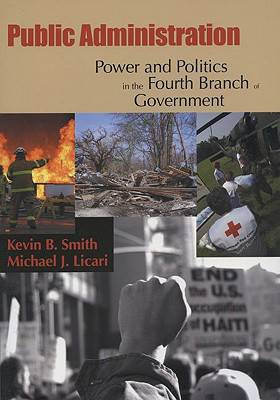
- Retrait gratuit dans votre magasin Club
- 7.000.000 titres dans notre catalogue
- Payer en toute sécurité
- Toujours un magasin près de chez vous
- Retrait gratuit dans votre magasin Club
- 7.000.000 titres dans notre catalogue
- Payer en toute sécurité
- Toujours un magasin près de chez vous
Public Administration
Power and Politics in the Fourth Branch of Government
Kevin B Smith, Michael J Licari
Livre broché | Anglais
218,95 €
+ 437 points
Description
Public Administration: Power and Politics in the Fourth Branch of Government presents public administration through the lens of politics and the policy-making power of the bureaucracy. By showing how the bureaucracy influences daily life, Smith and Licari bring the field of public administration alive for students. This text dispels the myth that the study of public administration is boring or irrelevant to students' lives by demonstrating just how deeply it pervades our lives. The authors focus on the bureaucracy--"the fourth branch of government"--as a key ingredient in politics and policy-making. This approach is novel, but it accurately reflects the true nature of public administration in America. This book examines our bureaucracy's considerable political power, where it comes from, how it is used, and how it can be controlled. Major Features: * Unique focus on political and policy-making power. This is the first public administration textbook to focus on the political and policy-making power of the bureaucracy. Without abandoning coverage of more traditional topics, this approach is more compelling to students because it demonstrates just how much influence the bureaucracy wields in our daily lives.
* Highlights the tension between democracy and bureaucracy. A central paradox at the heart of the political system is democracy's reliance on the very undemocratic bureaucratic institutions that characterize the administrative branch of government. This text seeks to explain why and lay out the implications of that dependency.
* Details the role and legitimacy of public administration in a democracy. There is an uneasy and fascinating relationship between the democratically elected leadership in government and the bureaucracies needed to carry out their decisions. This tension forms a running theme throughout the book.
* Solid multidisciplinary foundation. This book draws on literature by the most important academics in the fields of both public administration and political science.
* Readability. Smith and Licari write in an engaging, informal style that is rich in lively examples and free of academic jargon. Key terms are included in a glossary.
* Highlights the tension between democracy and bureaucracy. A central paradox at the heart of the political system is democracy's reliance on the very undemocratic bureaucratic institutions that characterize the administrative branch of government. This text seeks to explain why and lay out the implications of that dependency.
* Details the role and legitimacy of public administration in a democracy. There is an uneasy and fascinating relationship between the democratically elected leadership in government and the bureaucracies needed to carry out their decisions. This tension forms a running theme throughout the book.
* Solid multidisciplinary foundation. This book draws on literature by the most important academics in the fields of both public administration and political science.
* Readability. Smith and Licari write in an engaging, informal style that is rich in lively examples and free of academic jargon. Key terms are included in a glossary.
Spécifications
Parties prenantes
- Auteur(s) :
- Editeur:
Contenu
- Nombre de pages :
- 324
- Langue:
- Anglais
Caractéristiques
- EAN:
- 9780195330694
- Date de parution :
- 22-02-06
- Format:
- Livre broché
- Format numérique:
- Trade paperback (VS)
- Dimensions :
- 175 mm x 251 mm
- Poids :
- 589 g







